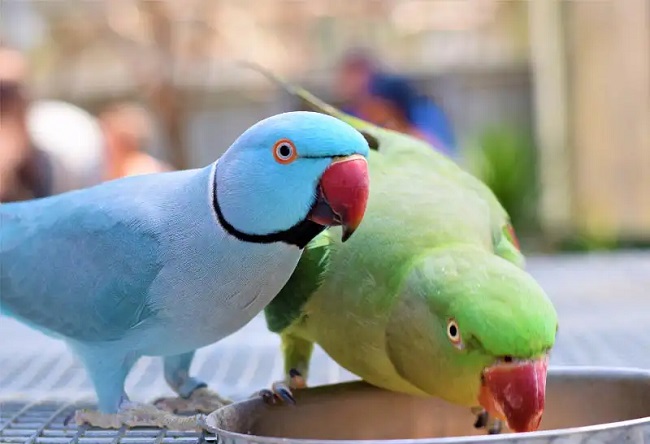Birds have long captivated us with their ability to mimic human speech, a trait that adds an extra dimension to the already rewarding experience of bird ownership. But not all birds are equally proficient talkers.
This article dives into the fascinating world of talking birds, focusing on the top 10 pet bird species known for their exceptional linguistic prowess.

Which Breeds of Birds Can Talk?
Birds mimic human speech through their syrinx, a vocal organ unique to birds. However, talking birds don’t understand language in the way humans do; instead, they mimic sounds they frequently hear and associate them with certain actions or emotions. Now, let’s explore the top talking bird species.
Read Also:
African Grey Parrots
Regarded as the gold standard of talking birds, African Grey Parrots are renowned for their exceptional ability to mimic human speech and sounds with uncanny accuracy.
They can build a large vocabulary and use it contextually, making them one of the most intelligent bird species.
Budgerigars
Often known as budgies or parakeets, Budgerigars are small, social, and chatty birds. With consistent training, they can learn a vast repertoire of words and phrases, often speaking in high, rapid chirps.
Amazon Parrots
Several species of Amazon Parrots are known for their talking skills, with the Yellow-naped Amazon particularly notable. They can mimic human speech clearly and often love being the center of attention.
Eclectus Parrots
Eclectus Parrots are not just visually striking; they are also impressive talkers. They can mimic a wide range of sounds, including human speech, with a clear, human-like voice.
Quaker Parrots
Also known as Monk Parakeets, Quaker Parrots are highly social and intelligent birds. They are adept at mimicking human speech, often learning phrases and songs from their human companions.
Cockatoos
Known for their playful personalities, Cockatoos can also mimic human speech. While they may not have as extensive a vocabulary as African Greys, they can learn several phrases and use them frequently.
Hill Mynas
Hill Mynas, particularly the Greater Hill Myna, are renowned for their vocal skills. They can produce a wide range of sounds, including human speech, and are known for their loud, clear voice.
Indian Ringneck Parakeets
Indian Ringneck Parakeets are intelligent birds with a talent for mimicry. With patience and regular training, they can learn a sizable vocabulary.
Cockatiels
While not as verbally proficient as other species on this list, Cockatiels can still learn to mimic common household sounds and simple phrases, especially if they are exposed to them frequently.
Macaws
Despite being more famous for their stunning coloration and large size, Macaws can also be skilled talkers. Blue and Gold Macaws, in particular, are known for their ability to mimic human speech.
Communication Beyond Mimicry
While their mimicry skills are impressive, it’s essential to understand that talking birds communicate in more ways than just replicating human speech.
They can express their moods and desires through different sounds, body language, and behaviors. For example, fluffed feathers could indicate illness or comfort, depending on the context, while a bobbing head often signals excitement.
Training Your Bird to Talk
Training a bird to mimic speech requires patience, consistency, and positive reinforcement. Start with simple words or short phrases, repeating them regularly to your bird.
Reward them with treats and praises when they make an effort to mimic the sounds. Remember, every bird is unique; some may pick up words quickly, while others may take longer.
Providing Adequate Care
Talking birds need more than just linguistic stimulation. They require a balanced diet, plenty of mental and physical exercise, and regular veterinary care. A healthy bird is more likely to be a happy, talkative bird.
Ethical Considerations
When considering getting a talking bird, it’s crucial to source them responsibly. Many species are caught in the wild and sold illegally, which is harmful to their natural populations.
Always ensure you’re buying from a reputable breeder or adopting from a rescue center.
Read Also:
Conclusion
The world of talking birds is a captivating one. While owning a talking bird can be an enchanting experience, remember that it requires a substantial commitment of time and effort to develop their linguistic skills.
Nevertheless, the bond that forms and the joy of hearing your feathered friend chat away is an experience like no other.
























